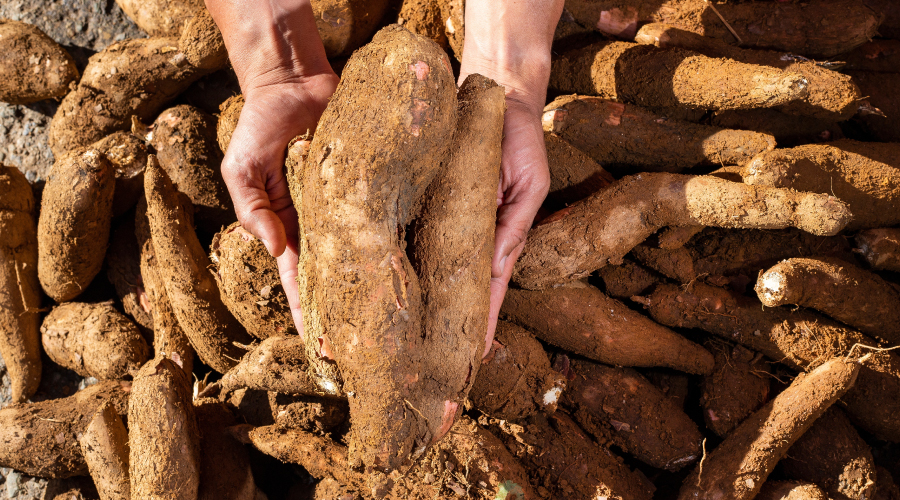

The cassava plant is regarded for its various benefits in the agricultural and nutritional fields because it is a resilient and multifaceted crop with a wide range of uses. Cassava, a plant from the tropics, also known as manioc or yuca, is native to South America and is now cultivated worldwide, has gone global across tropical regions, becoming a staple food source for millions of people. In this detailed blog, we will look into the details of the cassava plant, learning its advantages, uses, side effects, and even skincare properties.
All About Cassava Plant
The Cassava plant (Manihot esculenta) is a perennial woody shrub for cultivating starchy tuberous roots that are immensely utilised as a significant source of carbohydrates in many regions around the world. The unique feature of cassava is the fact that this plant can grow well in various climatic conditions such as poor soil and low rainfall. Hence, it thrives under adverse environmental conditions.
Cassava Benefits: Nourishment from the Earth
Here are the different ways in which Cassava plant benefits you:
- Rich Source of Carbohydrates: The cassava roots contain a large amount of complex carbohydrates coupled with sustainability as they provide energy to the body during daily activities and metabolism.
- Dietary Fibre Content: As a rich source of dietary fibre, cassava also helps to maintain proper bowel function and prevents constipation.
- Vitamins and Minerals: Cassava is a good source of essential vitamins and minerals that help maintain our general health, such as Vitamin C, Folate, potassium, and manganese, which aid in strengthening immunity.
- Gluten-Free Alternative: For people with gluten sensitivities or celiac disease, cassava is a great gluten-free substitute utilised for various culinary uses.
Exploring the Uses of Cassava
You can use Cassava in different ways:
- Food Staple: Cassava roots are used in various delicacies, including cassava flour, other products such as tapioca pearls and chips, and traditional foods, such as a slice of cassava cake and cassava fries.
- Industrial Applications: Beyond the kitchen, processed cassava is used for bioethanol production, starch, animal feeds, and biodegradable packaging materials.
- Medicinal Purposes: Traditionally, cassava has been used to treat many diseases, for instance, diarrhoea, fever, and inflammation, due to its healing nature.
Cassava Side Effects
It is important to use this plant with caution as it can have some side-effects:
- High in calories: Cassava has more calories than other root vegetables, with 191 per 100 grams. It is a significant staple crop in several countries due to its high-calorie content. But keep in mind that eating more calories than you burn can eventually lead to weight gain.
- Harmful if consumed raw: Improper preparation, excessive consumption, or raw consumption of cassava can all be hazardous. Chemicals known as cyanogenic glycosides are present in raw cassava. These can emit cyanide into your body if consumed.
The danger of cyanide poisoning is increased by consuming cyanogenic glycosides frequently or in large quantities. This can result in impaired thyroid and nerve function, paralysis, organ damage, and even death. Cooking and soaking cassava reduces the amount of these hazardous chemicals.
- Processed versions may be lower in nutrients: When peeled, chopped, and cooked too long, Cassava loses vitamins, minerals, fibre, and resistant starch. To prevent side effects, boiling the root before consuming it is still required.
Cassava Benefits for Skin Health
Beyond its use in food and industry, cassava has promising qualities as a skincare ingredient, providing nourishing qualities that support glowing, healthy skin:
- Nourishes the Skin
During winter, one of the most common skin issues is dryness. You can eliminate this problem by applying the cassava face pack or adding it to your diet. It will gently hydrate your skin from the inside, not allowing the skin to crack under extreme weather.
- Brightens Up Skin Complexion
The fibre content in the cassava is not just beneficial to shed deposited fat in the body, but it is also a great exfoliator. If you are dealing with dull and tanned skin, slightly exfoliating your skin with cassava can do wonders.
- Makes Your Skin Spotless
To remove stubborn marks, gently rub the cassava face mask on the skin before leaving it to sit. Focus especially on the affected areas. However, don’t get aggressive; otherwise, you might damage your sensitive skin.
Uses of Cassava Leaf as a Nutrient-Rich Superfood
Here’s how you Cassava leaf can work as a nutritious superfood for you:
- Nutrient Density: The vitamins found in cassava leaves include Vitamin A, B, and C as well as calcium, iron, and magnesium, making them a nutritious part of meals.
- Traditional Cuisine: Cassava leaves are typically used for the preparation of savoury dishes in many cultures, such as cassava leaf soup, other stews, and sautés. They are used to make traditional cuisine rich in flavour but also highly nutritious.
- Medicinal Uses: Cassava leaves have medicinal values, purported to treat inflammation, arthritis, and gastric disorders, among many other ailments.
Conclusion
The cassava plant has proven to be a fantastic source of food and energy. With its versatile roots and nutrient-rich leaves that influence the culinary, industrial, and medical industries, cassava benefits people all over the world.




